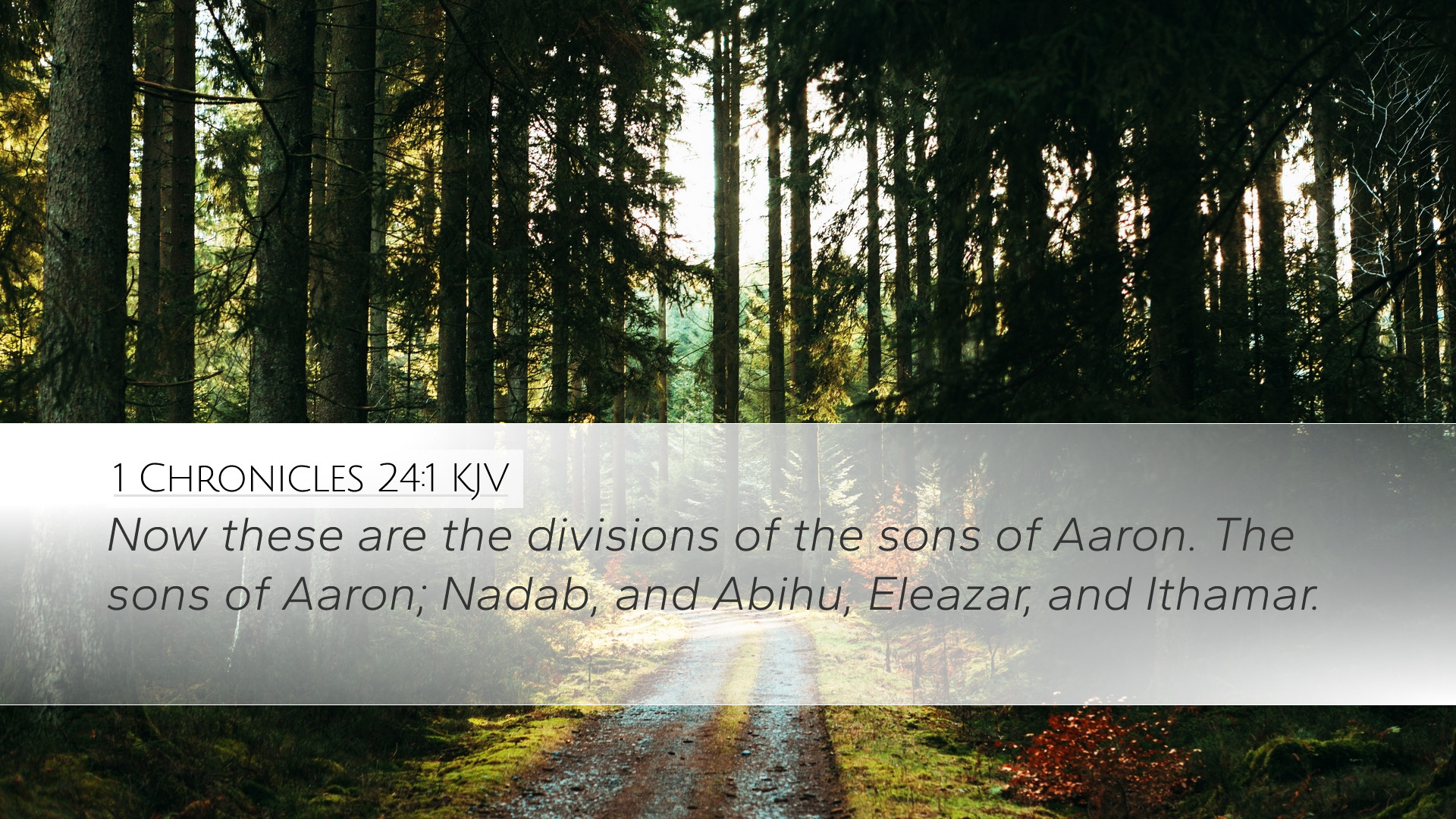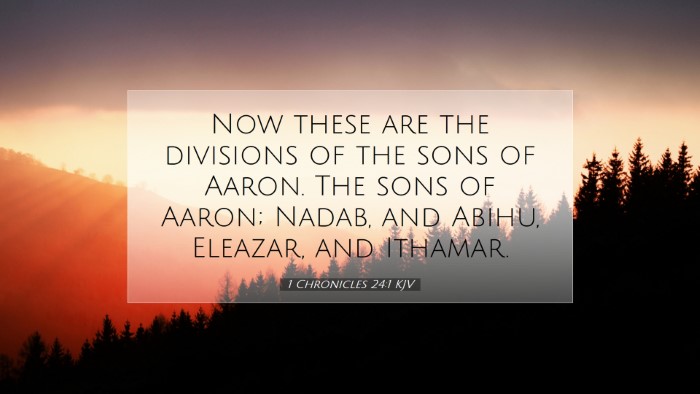Commentary on 1 Chronicles 24:1
Verse Context: 1 Chronicles 24:1 states, “Now these are the divisions of the sons of Aaron. The sons of Aaron were Nadab, Abihu, Eleazar, and Ithamar.” This verse serves as an introduction to the organization and responsibilities of the priestly families descended from Aaron, emphasizing the importance of divinely appointed order in worship and service.
Overview of Aaron's Sons
The mention of Aaron's sons sets the foundation for not just priestly service but the structure of worship in Israel. Aaron, as the first high priest, and his descendants were given pivotal roles within the tabernacle worship, which later transitioned to the temple.
Commentary Insights:
- Matthew Henry:
Henry emphasizes the providential arrangement of the priestly roles and how it reflects God's order. He highlights that the genealogical records act as a reminder of God's faithfulness to His covenant with Aaron and the Levites. The selection of these individuals as priests underscores God's specific choice for sacred duties, establishing a pattern of holiness that is essential in worship.
- Albert Barnes:
Barnes provides a historical context to the divisions of the priests, noting that the system of divisions not only maintained the priestly duties but also ensured that no one family or individual could monopolize the priestly office. He takes note of how these divisions served a practical purpose in administering the sacrificial system and in ensuring that all priests received their due portion of the offerings.
- Adam Clarke:
Clarke explores the significance of each of Aaron's sons in detail. While he respects the roles of Nadab and Abihu, he points to their tragic failure in offering strange fire before the Lord (Leviticus 10:1-2) as a cautionary tale against irreverence. He focuses on Eleazar’s and Ithamar’s roles in continuing the line of high priests, demonstrating the importance of fidelity to God's commandments in leadership.
The Theological Implications
The establishment of the divisions among Aaron's descendants not only served a practical liturgical function but also leads to profound theological insights regarding divine order, holiness, and service:
- The Nature of Holiness:
The priesthood required a commitment to holiness, and through this arrangement, God illustrates His desire for His people to be set apart. The emphasis on sanctification among Aaron’s sons reminds believers that access to God is mediated through holiness, echoing the New Testament understanding of Jesus Christ as our high priest.
- The Importance of Order in Worship:
The clear delineation of roles within the priesthood serves as a model for the church today. Pastors and church leaders can derive principles of organization and accountability in ministry from these ancient practices. Every role in ministry is vital to the overall function of the body of Christ, as established by the order seen in the Levitical priesthood.
- Covenant Faithfulness:
God's faithfulness to the tribe of Levi and the descendants of Aaron reminds believers of His unchanging nature. The responsibilities assigned to Aaron’s sons can be seen as a precursor to the establishment of a covenant relationship with His chosen people. This relationship continues to unfold in the New Testament as all believers are called to be a royal priesthood (1 Peter 2:9).
Lessons for the Modern Church
As congregations today study this passage, several practical applications emerge for contemporary ministry:
- Holiness and Service:
There is an enduring challenge for pastors and church leaders to pursue holiness in their lives, ensuring that their service to God is marked by purity and obedience to God's Word.
- Unity in Diversity:
While roles may differ within church ministry, the unity found in Christ establishes a harmony akin to that seen among the priests. Understanding that each member has a role promotes collaboration and prevents division.
- Faithfulness to God’s Calling:
The historical recounting of Aaron's sons serves as a solemn call to maintain faithfulness to God’s calling on each believer's life. Understanding their designated roles offers a reflection on the dedication required to fulfill God's plans for each generation.
Conclusion
In summary, 1 Chronicles 24:1 provides significant insight into the structure of the priesthood, underscoring the divine principles of order, holiness, and covenant faithfulness which continue to resonate within the church today. The commentary from respected biblical scholars helps illuminate these themes, offering a well-rounded understanding for pastors, students, and theologians alike as they navigate the complexities of their faith and ministry.


